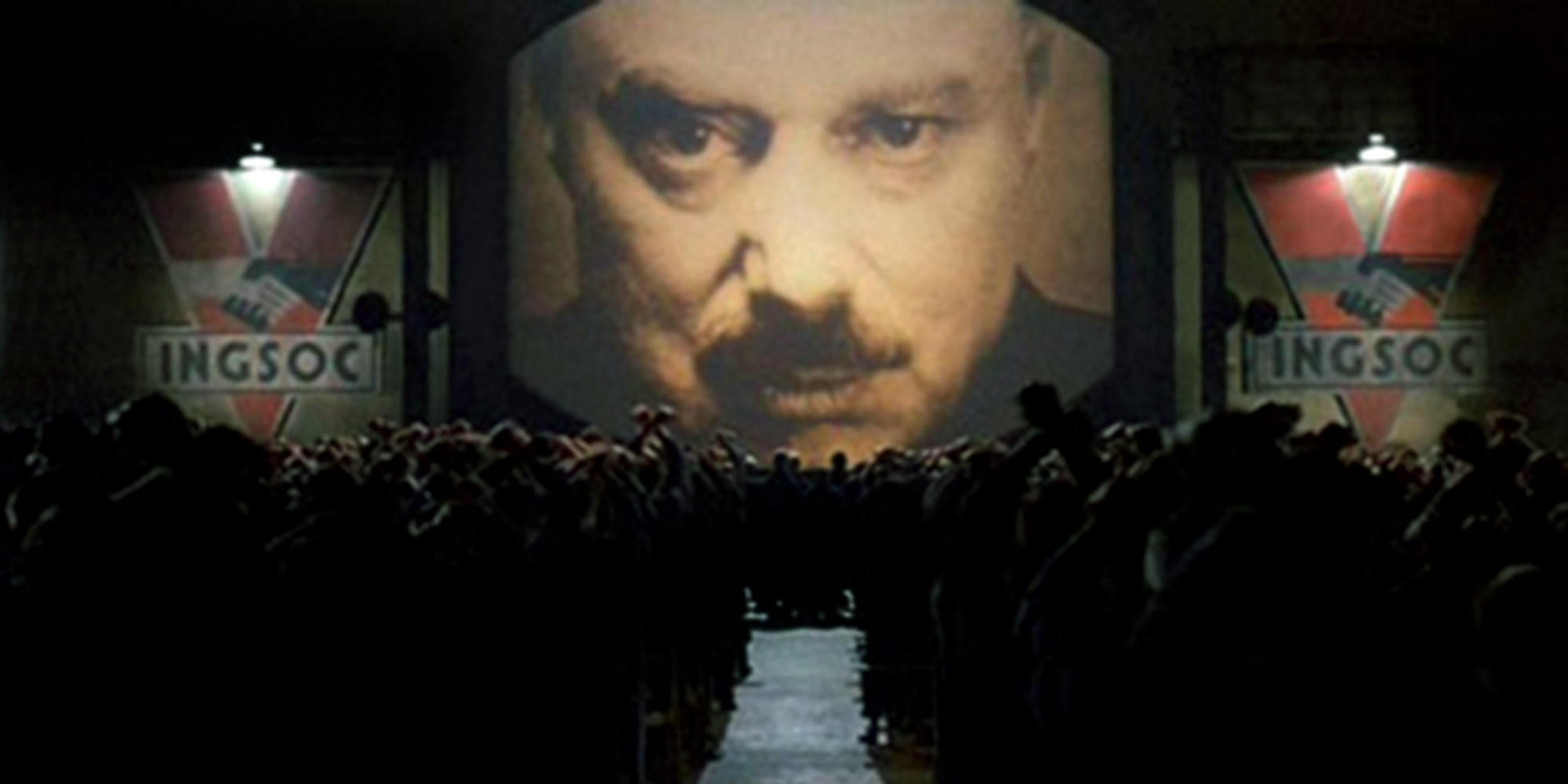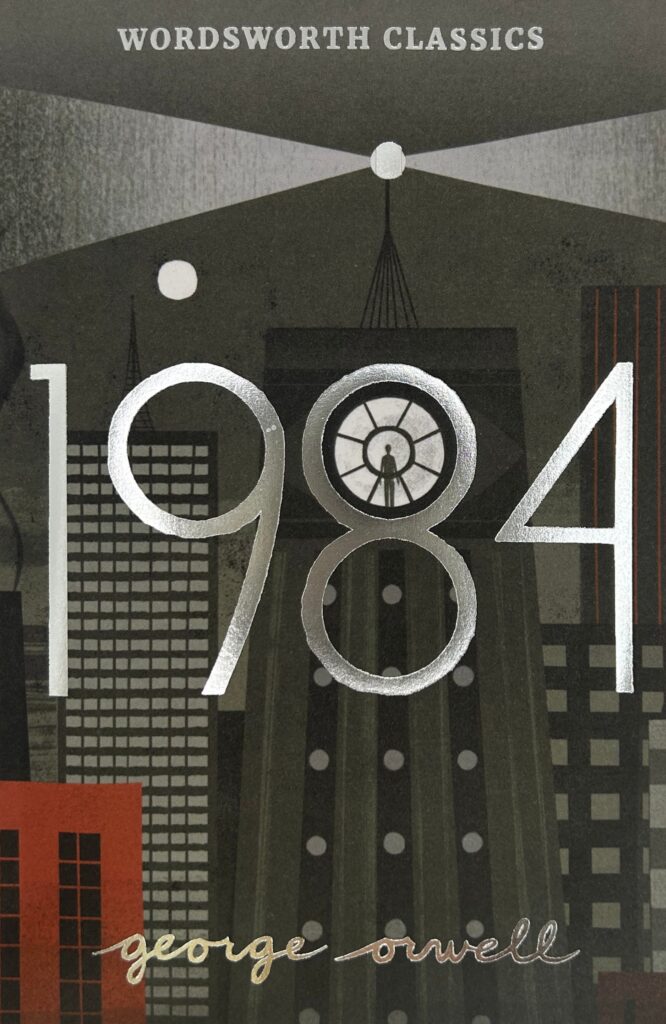
Mr Orwell dramatised
Part Two: Nineteen Eighty-Four. David Stuart Davies looks at the many adaptations of Orwell’s dystopian classic.
‘War is peace. Freedom is Slavery. Ignorance is Strength.’
Eric Arthur Blair, novelist, essayist and journalist was born in 1903. You will know this remarkable man of letters as George Orwell, who produced at least two of the greatest novels of the mid-twentieth century. His most famous books are Animal Farm (1945) and Nineteen Eighty-Four (1950). Both are clever pessimistic satires about the threat of political tyranny. While each novel carries a strong message, they are wrapped up in engaging narratives, which appeal to a wide readership.
Nineteen Eighty-Four is a dystopian warning concerning a future that Orwell believed was possible unless we took action now – now being 1948 when the novel was published. The author deals with the loss of faith in humanity which affected British futuristic fiction in the 1930s and was intensified in World War II. It provides a heavily ironic commentary on the state of the world at the time. As Orwell observes in the book: ‘If you want a picture of the future, imagine a boot stamping on a human face – forever.’
In the novel, Britain has become Airstrip One in the superstate Oceania. It is ruled by the totalitarian Party under the aegis of the possibly non-existent Big Brother. Winston Smith, a minor party operative, commits thought crimes by keeping a secret diary and loving a girl named Julia. He is tortured into self-betrayal by O’Brien, a member of the Inner Party, in the dreaded Room 101 wherein resides every man’s personal horror – in Smith’s case, it is rats. His spirit is utterly broken and he surrenders his identity to the state and learns to love Big Brother.
There have been a number of interesting dramatized presentations of this controversial novel. The first and most notable one was a BBC television adaptation screened in 1954. The script was by Mr Quatermass himself, Nigel Kneale, and featured Peter Cushing as Winston Smith, Andre Morell as O’Brien and Yvonne Mitchell as Julia. At this time the vast majority of the BBC’s drama output was performed live. There were some pre-shot film inserts if necessary and these helped to cover changes of scene or show location material which would not have been possible to present live in the studio. Some filming for this programme was carried out at Alexandra Palace, originally the first home of BBC television in the thirties but by 1954 had been almost abandoned by them. The play began transmission on Sunday 12th December at 20.37 and ran for two hours. Then, as was the practice in those days, it was repeated the following Thursday. Of course, rather like a stage play, it had to be acted all over again. Seven million viewers watched the second broadcast, making it the largest television audience in the UK since the coronation of Queen Elizabeth II the previous year. At the time television images could only be preserved on film by using special equipment known as ‘telerecording’ and this was used only sparingly because of the cost. However, this was employed to capture the second performance of the play and it is preserved in the archives.
The production, now regarded as a milestone in British television drama, provoked great controversy at the time. There were complaints about the ‘horrific’ content –, particularly in the Room 101 scene where Smith is faced with the rats – and worries about the ‘subversive’ nature of the drama. There were even questions in Parliament and demands that it should not have a repeat broadcast. However, unanimous praise was given to all the cast, in particular for Peter Cushing in the role of Winston Smith.
Cushing stated in his autobiography that the scene where the rats were meant to attack him was problematic. Initially, the rodents had been captured from ‘the dank sewers of London’. Unused to such cosy quarters as the television studio, where they were cossetted and well-fed, when it came time for them to perform, they just curled up and went to sleep. ‘They were sacked on the spot, and a minion was dispatched post-haste to the nearest pet shop to purchase a couple of tame ones, which were white and had to be dyed dark brown… Strict instructions were issued not to feed them under any circumstances, in the hope they would be ravenous when it came time to use them’.
Cushing also believed that the second performance, which was recorded, ‘lacked the spontaneity and inspiration of the first, suffering from the furore provoked during those three intervening days.’
In 1965 another version of Kneale’s adaptation was produced in BBC2’s Theatre 625 starring David Buck as Smith. Long believed lost, a damaged copy, missing seven minutes of footage, was discovered in the American Library of Congress in 2010.
The 1954 television production prompted a British movie version, which was released in 1956 starring American actor Edmund O’Brien as Smith and Michael Redgrave as O’Brien (re-named O’Conner in this version). The reviewer in the New York Times called the film, ‘stark sober and thoughtful’ but added that the screenplay had ‘adapted the book freely’ while retaining the novel’s ‘essential spirit and idea’. However, it wasn’t regarded as a major production and was released on a double bill with a minor sci-fi thriller, The Gamma People.
A second big-screen version appeared, appropriately in 1984, to generally great acclaim and was nominated for a BAFTA. It starred Richard Burton as O’Brien; it was his last film role. John Hurt played Smith. Many of the scenes were shot on the actual dates mentioned in the novel. For example, the moment where Smith writes the date ‘April 1984’ in his diary was actually filmed on this day. In reviewing the movie Rotten Tomatoes observed: ‘1984 doesn’t fully emerge from the shadow of its source material, but still provides a solid suitably discomfiting adaptation of a classic dystopian tale’.
There have been many radio adaptations of Orwell’s novel, too numerous to mention. The BBC has produced three versions over the years and American radio shows have featured such actors David Niven, Richard Widmark and Vincent Price portraying Smith. The latest BBC radio adaptation in 2013 starred Christopher Eccleston. There have been a number of stage versions, an opera and a ballet all based on the novel, proving that it remains a rich source for the dramatic endeavour. This is because not only does Orwell’s Nineteen Eighty-Four present a powerful political statement but it also incorporates a compelling human drama and a tragic love story.
Image: Still from the film ‘1984’, released in 1984 and directed by Michael Radford © Umbrella-Rosenblum Films Production.
Credit: Collection Christophel / Alamy Stock Photo
Books associated with this article
